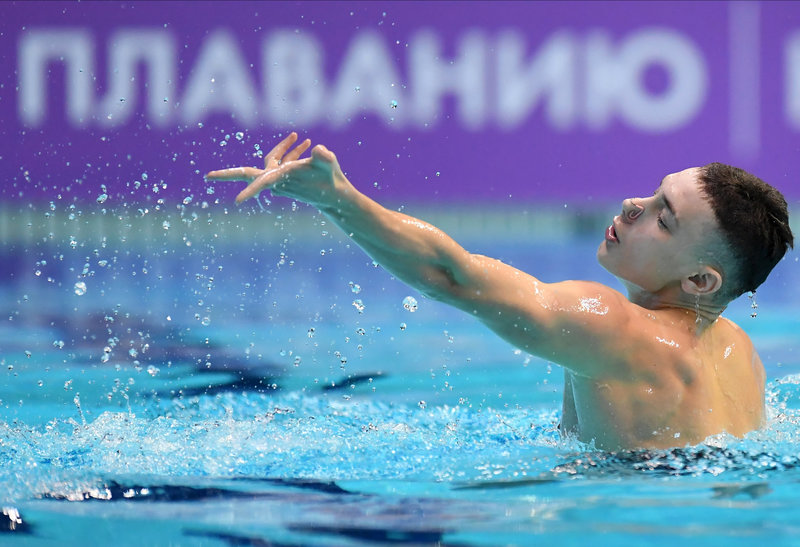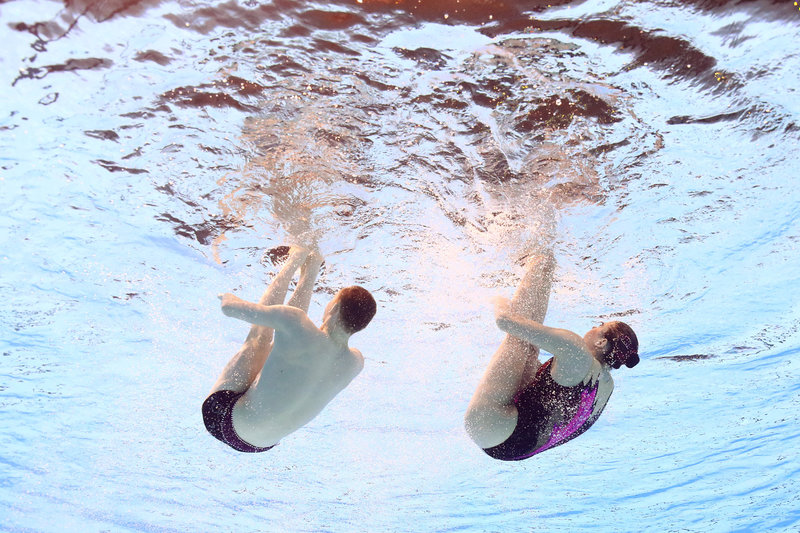The FINA World Championships begin this week in Budapest. In synchronized swimming, there will certainly be a new world champion – Alexander Maltsev, like other Russian athletes, will not be able to compete under the auspices of the International Swimming Federation (FINA) until the end of the year.
– Sasha, where do you train now? Still on the Round? Is there still a closed regime?
– At Krugly, we only train during training camp. You still can’t leave the base. In general, it is psychologically difficult, because a change of scenery is necessary. When there were more departures, the year passed quickly, now it is more difficult.
– How to make variety in life in this situation?
I am in my final year of graduate school this year. I am writing a doctoral thesis, I work with children in Moscow. More recently he staged a program for Lesha Chuikov and Olya Blinova – they are 11 years old. In a month we will go to the All-Russian competition “White Nights” in St. Petersburg. Everything happened very spontaneously. The guys are trained by different coaches – Anastasia Tabolina and Natalia Kiriakidi. They offered to put the guys in pairs and, as I had already worked with the boys from the MSFSO sports school, they asked me if I could put something on them.
– Do you like installing programs?
– As. I began to try my hand at directing quite early – back in St. Petersburg, then in Moscow. He organized programs for athletes from Tatarstan. For example, the solo with which Artur Korshunov performed at the Russian Championships was delivered by me.
– It turns out that you prepare competitors for yourself?
– Can you say that. I try to share my experience and knowledge with other athletes. It is important to me that there is competition in our sport.
– Back to the thesis – what is it about?
The topic will always be updated. It is linked to the general and special preparation of synchronized swimmers, with their somatotype.
– Why not synchronizers?
— In scientific work, a large sample of athletes is important. It is still difficult to gather a large number of boys of the same age. But in the future, I plan to research simultaneous interpreters.
Where do you find the motivation to keep doing it? At first there were no men in synchronized swimming at all, then there was skepticism about inclusion, then a postponed prospect of Olympic status.
– There is a motivation, and a very serious one. Despite the fact that our discipline is still non-Olympic, there are other competitions – the World and European Championships. At the same time, the opponents at the Games would be the same as at the World Championships.
In general, it seems to me that the status of the Olympics is somewhat overstated in people’s minds. Moreover, it is one thing when the Games respect the Charter and the Olympic principles, when there is high morality, then it must be sought. But, as we have seen in recent years, Olympic principles are violated from time to time. I no longer know which of them would not be violated, so it seems to me that it is not worth building such a global direct dependence on the Olympics. In Russia, the sports system, even in terms of financial components, favors Olympic sports and disciplines, but I think that sooner or later we will start to move away from them.
– How is the whole story with the fight for a place in the Olympic program?
– FINA is ready to fight for the place of mixed pairs in the Olympic programme. The decision still rests with the IOC. I would like our Olympic Committee to get involved in this, to lobby for our interests, but unfortunately we have never met the president of the ROC, we have not discussed this issue. It’s hard to make progress, but I try to talk with athletes from other countries so that they are somehow included in this process, to raise this issue in front of their national committees. It is important to jointly promote this idea.
— Do you consider yourself passionate about your business? Not all athletes are ready to fight like this for their appearance, the respect of rights and the promotion of their discipline.
— As a pioneer of Russian men’s synchronized swimming, I see this as my goal. If I came to synchronized swimming and there were already mixed pairs, maybe there wouldn’t be such enthusiasm, although… I doubt it. It is very interesting for me to participate in the development of my sport, so that there will be a high result in the future and synchronized swimming itself will become more popular. I wish there was more attention to our sport, more broadcasts – we were very surprised when our federation refused to broadcast the Russian championship.
– Saber fencer Sofia Pozdnyakova recently said that figure skaters pay too much attention. The horse broke, and a whole story ensued.
– I think that for a sport such attention is good. Of course, there is always a downside.
– Although FINA and LEN competitions are not available for us, how viable do you think it is to have some kind of coolest synchronized swimming tournament with show elements? After all, there is no doubt – in this sport we have no equal.
– It is possible to organize such a tournament, but in order to make it more interesting, other countries should try to participate. There should be cooperation between different countries, and in connection with the latest social media events, I tried to defend this principle. “Sport is outside of politics” – so said Pierre de Coubertin. This principle is constantly violated, but we as athletes must follow it, unite and not organize some kind of nationwide protest, boycott. The Olympic principle of non-discrimination on the basis of nationality is violated, and there is also gender discrimination in synchronized swimming and rhythmic gymnastics. Discriminatory decisions are made, some under pressure from athletes from other countries, and this only makes the situation worse.
– Are there those who support you in private messages?
– Personally, yes. In public, everyone is rather neutral or opposes us with aggression. Under the message from the German team, which wrote that the German federation had decided to withdraw them from the competition as a sign of disagreement with FINA’s decision to allow the Russians in a neutral status, I left a comment according to which sport should unite, not divide. Some athletes have started leaving comments that we should have a collective responsibility.
— You have already said that there is gender discrimination in synchronized swimming and rhythmic gymnastics, but in your neighboring sport, swimming, one of the main topics is now the participation of transgender people in women’s competitions. Many see it as a threat to women’s sport in general. You might run into this problem backwards, don’t you think?
– That we’ll have trans men on stage? I’m not ruling anything out, but so far I haven’t heard of such a thing, and cases of transgender people in top sports are still isolated.
Source : MatchTV




